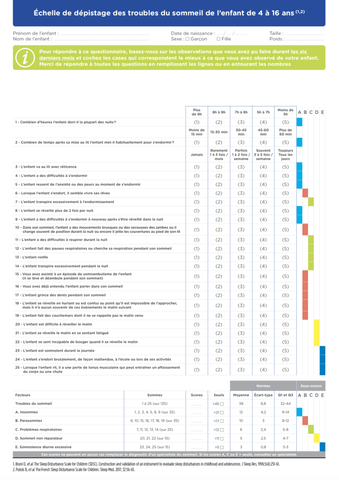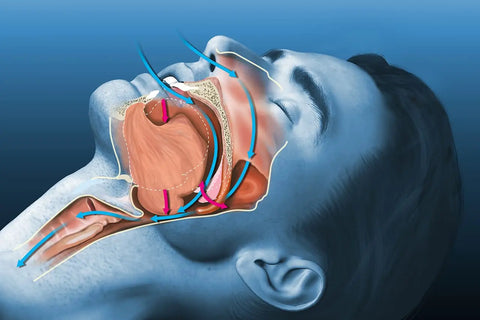The sleep questionnaire is there to decipher your nights.
It helps you to identify possible disorders such as insomnia or sleep apnea and guides you towards more restful rest.
By answering questions about your sleep habits, you can take the first step towards improving your nocturnal well-being.
You can now complete the questionnaire.
Why is the sleep questionnaire important?
The link between sleep and overall health
Quality sleep not only influences your daily energy levels, it also affects every aspect of your health:
💊 mental,
💊 physics,
💊 emotional.
Insufficient or poor quality sleep can be the first domino in a chain of negative consequences, affecting everything from your mood to your metabolism.
The sleep questionnaire can help you identify weaknesses in your sleep routine and take steps to improve them.
Identifying warning signs
💊 Frequent awakenings,
💊 difficulty falling asleep,
💊 feeling tired after a full night's sleep?
These signals may indicate an underlying disorder.
The sleep questionnaire helps you to recognize these warning signs, enabling early intervention and preventing simple sleep problems from developing into more serious disorders.

How does a sleep questionnaire work?
Questionnaire structure
The typical sleep questionnaire consists of different sections, each targeting a specific aspect of your sleep experience.
Questions about:
💊 the time at which you fall asleep and wake up,
💊 on the quality of your sleep,
💊 on possible night-time disturbances.
Types of questions
The questions range from the simple (" What time do you go to bed? ") to more complex ones (" Rate the quality of your sleep on a scale of 1 to 10 ").
For a more detailed description, they may include:
💊 multiple choices,
💊 open-ended questions.
The goal? Provide an accurate, nuanced picture of your sleep, allowing you to detect patterns or anomalies that could indicate sleep problems.
The different types of sleep questionnaires and their usefulness
More on the Pittsburgh questionnaire
The Pittsburgh Questionnaire often considered a mainstay in sleep quality assessment, ventures beyond simple questions about bedtime and wake-up times.
It examines seven components, including:
💊 sleep duration,
💊 efficiency,
💊 nocturnal disturbances.
By detailing your sleep patterns over a four-week period, it shows a nuanced perspective on your health, helping to identify patterns that might indicate sleep disorders or avenues for improving sleep quality.
Details on Epworth Sleepiness Index
The Epworth Sleepiness Index is based on daytime sleepiness, a symptom of several sleep disorders such as narcolepsy and sleep apnea.
Using eight everyday situations, this questionnaire assesses the probability of falling asleep in contexts where it is inappropriate to do so.
Your score reveals the degree of your daytime sleepiness, showing clues about the quality and quantity of your night-time sleep, and suggesting whether further medical assessment may be required.
Why take the test at any age?
Importance of the college sleep questionnaire
In middle school, young people are growing and undergoing many hormonal changes that affect their sleep.
A questionnaire can help detect any poor sleep habits or disorders such as insomnia or restless legs syndrome, which can impact concentration, learning and growth.
The role of the youth sleep questionnaire
For young people, especially teenagers, sleep is important for their development and mental health.
Questionnaires may reveal sleep patterns disturbed by:
💊 the use of screens,
💊 the stress of studying,
💊 the biological changes typical of this age group.
The questionnaire on sleep and adolescents
Adolescence is an important period of transition, when the need for sleep is great, but often neglected.
A questionnaire can help identify disorders such as sleep phase delay, common in teenagers, enabling strategies to be adopted for more regular, restorative sleep.
The usefulness of the sleep questionnaire for adults
In adults, sleep questionnaires are essential for detecting disorders such as sleep apnea, insomnia or stress, which can have serious repercussions on health.
They provide a basis for discussions with healthcare professionals and can help improve overall quality of life.

The Back2Sleep solution, the intranasal orthosis
The intranasal orthosis by Back2Sleep is a discreet device designed to be inserted into the nostrils to optimize night-time breathing.
It works on the principle of facilitating the passage of air, which reduces the risk of respiratory disturbances that can interfere with the natural sleep cycle.
This can be particularly beneficial for those suffering from mild sleep apnea or snoring, as better night-time breathing means less interrupted, deeper sleep.
Frequently asked questions about the sleep questionnaire
Q. How can you prepare your environment to improve sleep quality?
- The sleeping environment plays an important role in the quality of your rest.
Here are a few tips to make it a good place to sleep:
- Darkness: make sure your room is dark enough and use blackout curtains if necessary.
- Silence: reduce noise as much as possible. Earplugs may be an option if you can't control the surrounding noise.
- Temperature: keep the room at a comfortable temperature, generally between 16°C and 18°C.
- Comfort: invest in a good mattress and pillows that support your body properly.
- Routine: create a bedtime ritual that promotes relaxation, such as reading or listening to soft music.
By optimizing these elements, you create a sanctuary that invites restful sleep.
Can the questionnaire diagnose sleep disorders?
- Although the sleep questionnaire is a useful self-assessment tool, it does not replace a professional diagnosis.
It can help you identify patterns or habits that might indicate the presence of disorders, but a full evaluation by a sleep specialist is necessary for an accurate diagnosis.
If your results suggest sleep problems, it's advisable to consult a doctor for further exploration and a suitable treatment plan.

- Choosing a selection results in a full page refresh.
- Opens in a new window.







